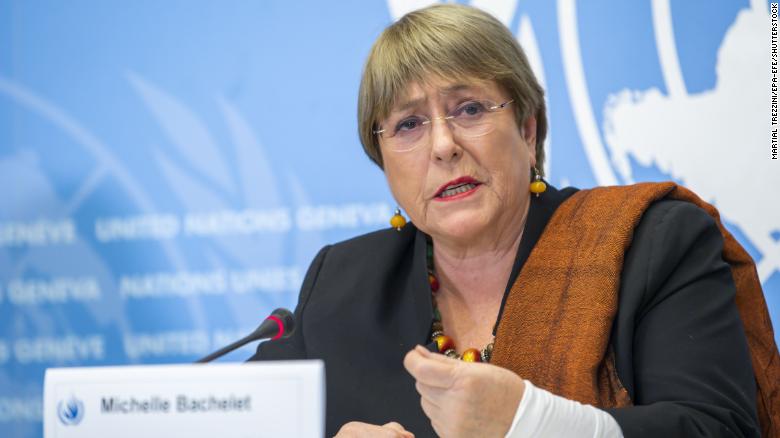
Chinese President Xi Jinping defended his country’s human rights record on Wednesday, telling a visiting UN official there is “no need for ‘preachers’ to boss around other countries.”
Xi’s remarks, made in a video call with the United Nations High Commissioner for Human Rights Michelle Bachelet, are likely to add to the controversy surrounding a trip that critics say risks becoming a propaganda tool for Beijing.
Bachelet, who arrived in China on Monday for a six-day tour, is expected to visit the far-western region of Xinjiang, where the Chinese government faces accusations of mass internment, forced assimilation, forced labor and forced sterilization against Uyghur and other mostly Muslim minorities.
Beijing has repeatedly denied the allegations.
But the trip — the first by a UN human rights chief to China since 2005 — has been dogged by questions about Bachelet’s access and freedom to speak with locals unsupervised, raising fears it risks the credibility of her office.
On Wednesday, Xi told Bachelet China’s human rights development “suits its own national conditions.”
“On the issue of human rights, no country is perfect, there is no need for ‘preachers’ to boss around other countries, still less should they politicize the issue, practice double standards or use it as an excuse to interfere in other countries’ internal affairs,” Xi was quoted as saying by Chinese state broadcaster CCTV.
Bachelet said she committed to the visit because “it is a priority to engage with the Government of China directly, on human rights issues,” according to a statement provided to CNN by the OHCHR.
“For development, peace and security to be sustainable — locally and across borders — human rights have to be at their core,” Bachelet said. “China has a crucial rule to play within multilateral institutions in confronting many of the challenges currently facing the world, including threats to international peace and security, instability in the global economic system, inequality, climate change and more.”
Neither the CCTV readout of the meeting nor Bachelet’s statement mentioned Xinjiang.
Bachelet is expected to visit the cities of Kashgar and Urumqi in Xinjiang, according to China’s Foreign Ministry. The ministry said her trip will be conducted in a “closed loop” — meaning her delegation will be isolated inside a “bubble” to contain the potential spread of Covid-19, and no international journalists will be allowed to travel with her.
“We have no expectation that (China) will grant the necessary access required to conduct a complete, unmanipulated assessment of the human rights environment in Xinjiang,” US State Department spokesman Ned Price told reporters Tuesday.
“We think it was a mistake to agree to a visit under the circumstances,” Price said, adding that Bachelet would not be able to obtain a full picture “of the atrocities, the crimes against humanity, and genocide” in the region.
In a statement Monday, Amnesty International said Bachelet must “address crimes against humanity and gross human rights violations” during her trip.
“Michelle Bachelet’s long-delayed visit to Xinjiang is a critical opportunity to address human rights violations in the region, but it will also be a running battle against Chinese government efforts to cover up the truth,” the organization’s Secretary-General Agnes Callamard said.
“The UN must take steps to mitigate against this and resist being used to support blatant propaganda.”
As reported by CNN
